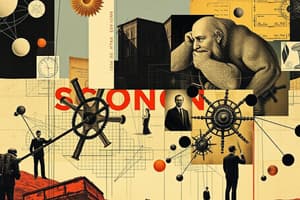Podcast
Questions and Answers
What is the primary role of technology in relation to science?
What is the primary role of technology in relation to science?
- To create hypotheses for scientific experiments
- To apply knowledge in solving practical problems (correct)
- To document scientific discoveries
- To replace scientific methods with artistic approaches
Which of the following best describes science?
Which of the following best describes science?
- An artistic interpretation of natural phenomena
- A systematic body of knowledge gained through observation and experimentation (correct)
- A set of fixed beliefs about the natural world
- A static collection of knowledge
How does Science, Technology, and Society (STS) primarily influence scientific research?
How does Science, Technology, and Society (STS) primarily influence scientific research?
- By isolating technology from societal changes
- By addressing how cultural values affect innovation (correct)
- By establishing a foundation of absolute truths
- By prioritizing technological advancements over scientific integrity
Which of the following is NOT a role of technology mentioned?
Which of the following is NOT a role of technology mentioned?
Which civilization is known for developing a writing system called cuneiform?
Which civilization is known for developing a writing system called cuneiform?
What does the Greek word 'technologia' mean?
What does the Greek word 'technologia' mean?
Which category does the study of natural phenomena fall under?
Which category does the study of natural phenomena fall under?
What is one of the key contributions of the ancient Egyptian civilization?
What is one of the key contributions of the ancient Egyptian civilization?
Which civilization thrived between the Tigris and Euphrates rivers and became the center of ancient Mesopotamia?
Which civilization thrived between the Tigris and Euphrates rivers and became the center of ancient Mesopotamia?
What type of knowledge does science primarily consist of?
What type of knowledge does science primarily consist of?
Which of the following is a mathematical contribution of the ancient Sumerians?
Which of the following is a mathematical contribution of the ancient Sumerians?
Among the following, which is considered a cradle of early science?
Among the following, which is considered a cradle of early science?
What was the main advantage of the canals developed by the Babylonian civilization?
What was the main advantage of the canals developed by the Babylonian civilization?
Which writing system was primarily used by the ancient Egyptians?
Which writing system was primarily used by the ancient Egyptians?
What material was predominantly used by ancient Egyptians for writing?
What material was predominantly used by ancient Egyptians for writing?
Which technological advancement is attributed to the Sumerians?
Which technological advancement is attributed to the Sumerians?
Which civilization is associated with the invention of gunpowder?
Which civilization is associated with the invention of gunpowder?
What period is traditionally known as the Middle Ages?
What period is traditionally known as the Middle Ages?
What technological advancement was NOT made during the Medieval period?
What technological advancement was NOT made during the Medieval period?
Which of the following inventions is associated with the Roman Empire?
Which of the following inventions is associated with the Roman Empire?
Who served as the foundation of western civilization in ancient Greece?
Who served as the foundation of western civilization in ancient Greece?
What agricultural technique was improved during the Medieval period?
What agricultural technique was improved during the Medieval period?
The civilization that thrived along the Nile River is known as?
The civilization that thrived along the Nile River is known as?
Which ancient civilization is credited with the first widespread use of codex books?
Which ancient civilization is credited with the first widespread use of codex books?
What significant impact did Johannes Gutenberg's invention have on society?
What significant impact did Johannes Gutenberg's invention have on society?
Which scientist is known for the basic law of falling bodies?
Which scientist is known for the basic law of falling bodies?
What was Alexander Fleming's key discovery that led to the formation of modern-day antibiotics?
What was Alexander Fleming's key discovery that led to the formation of modern-day antibiotics?
What was Louis Pasteur's significant contribution to biology?
What was Louis Pasteur's significant contribution to biology?
Which of the following inventions is Alexander Graham Bell credited with?
Which of the following inventions is Alexander Graham Bell credited with?
What practical application did Samuel M. Kier's invention of kerosene initially serve?
What practical application did Samuel M. Kier's invention of kerosene initially serve?
What is Zacharias Janssen known for inventing?
What is Zacharias Janssen known for inventing?
What time period was associated with the rise of modern society and industry?
What time period was associated with the rise of modern society and industry?
Flashcards are hidden until you start studying
Study Notes
Science, Technology, and Society
- Science refers to a systematic body of knowledge gained through observation and experimentation, leading to theories, laws, and concepts that explain natural phenomena.
- Divided into three main branches: formal sciences, natural sciences, and social sciences.
- Technology, derived from the Greek 'technologia,' focuses on applying knowledge to solve practical problems and improve human life.
- Technology encompasses a complex system involving knowledge, skills, methods, and tools for developing products and services.
Roles of Technology
- Aids in discovering and producing medicine.
- Helps preserve food and develop new energy sources.
Historical Antecedents of Science
- Ancient civilizations like the Sumerians, Babylonians, Egyptians, Greeks, Romans, and Chinese made significant contributions to early science and technology.
Sumerian Contributions
- Located in Mesopotamia, known for innovations like mass-produced pottery, the wheel, early chariots, cuneiform writing, metallurgy, and mathematics.
Babylonian Achievements
- Established the center of Mesopotamian civilization, contributing to advancements in irrigation (canals) and astrology (star catalogs).
Egyptian Innovations
- Flourished along the Nile River from 5,000 - 3,100 BC, known for the development of the calendar, mathematics, papyrus, hieroglyphics, and mummification.
Greek Civilization
- Emerged around 1,100 BC; crucial philosophers laid the foundation for Western thought, contributing inventions like the water mill and water clock.
Roman Empire Contributions
- Known for military and administrative prowess; innovations include Roman numerals, the Acta Diurna (gazette), and the codex/book binding.
Chinese Civilization
- The oldest civilization in Asia; notable inventions include gunpowder, silk, acupuncture, and tea.
Medieval Period Advances
- Spanning roughly from the collapse of the Western Roman Empire to the late 15th century; characterized by significant technological innovations including windmills, spectacles, mechanical clocks, and Gothic architecture.
Key Figures in Technological Advancements
- Johannes Gutenberg: Invented the movable type printing press, revolutionizing book production and promoting literacy.
- Zacharias Janssen: Credited with inventing the optical telescope and compound microscope.
- Galileo Galilei: Known for formulating the laws of falling bodies and constructing advanced telescopes for astronomical observations.
Rise of Modern Society
- The 19th century saw the emergence of modern society and industry, leading to breakthroughs in communication, transportation, and medicine.
- Louis Pasteur: Disproved the Theory of Spontaneous Generation and pioneered pasteurization through his Swan Flask experiment.
- Alexander Graham Bell: Received the first patent for the electric telephone in 1876.
- Alexander Fleming: Discovered penicillin from mold, marking a key milestone in antibiotic development.
- Samuel M. Kier: Innovated kerosene by refining petroleum, initially known as illuminating oil for lighting homes.
Studying That Suits You
Use AI to generate personalized quizzes and flashcards to suit your learning preferences.




